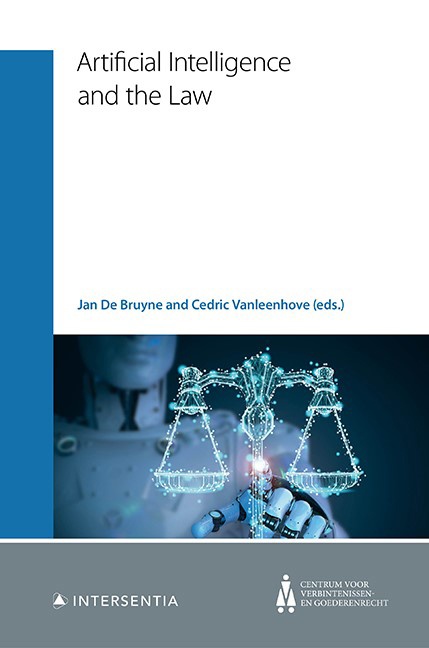Book contents
- Frontmatter
- Contents
- Foreword
- Contributing Authors
- Chapter 1 Basic Concepts of AI for Legal Scholars
- Chapter 2 Different Models of Innovation and Their Relation to Law
- Chapter 3 Setting the Scene: On AI Ethics and Regulation
- Chapter 4 Quantitative Legal Prediction: the Future of Dispute Resolution?
- Chapter 5 AI Arbitrators … ‘Does Not Compute’
- Chapter 6 AI through a Human Rights Lens. The Role of Human Rights in Fulfilling AI’s Potential
- Chapter 7 Killer Robots: Lethal Autonomous Weapons and International Law
- Chapter 8 AI and Data Protection: the Case of Smart Home Assistants
- Chapter 9 AI and IP: a Tale of Two Acronyms
- Chapter 10 Tax and Robots
- Chapter 11 Robotisation and Labour Law. The Dark Factory: the Dark Side of Work?
- Chapter 12 The Hypothesis of Technological Unemployment Caused by AI-Driven Automation and its Impact on Social Security Law
- Chapter 13 AI in Belgian Contract Law: Disruptive Challenge or Business as Usual?
- Chapter 14 Tort Law and Damage Caused by AI Systems
- Chapter 15 Insurance Underwriting on the Basis of Telematics: Segmentation and Profiling
- Chapter 16 AI and Creditworthiness Assessments: the Tale of Credit Scoring and Consumer Protection. A Story with a Happy Ending?
- Chapter 17 AI and the Consumer
- Chapter 18 Robots and AI in the Healthcare Sector: Potential Existing Legal Safeguards Against a(n) (Un)justified Fear for ‘Dehumanisation’ of the Physician-Patient Relationship
Chapter 18 - Robots and AI in the Healthcare Sector: Potential Existing Legal Safeguards Against a(n) (Un)justified Fear for ‘Dehumanisation’ of the Physician-Patient Relationship
Published online by Cambridge University Press: 26 May 2021
- Frontmatter
- Contents
- Foreword
- Contributing Authors
- Chapter 1 Basic Concepts of AI for Legal Scholars
- Chapter 2 Different Models of Innovation and Their Relation to Law
- Chapter 3 Setting the Scene: On AI Ethics and Regulation
- Chapter 4 Quantitative Legal Prediction: the Future of Dispute Resolution?
- Chapter 5 AI Arbitrators … ‘Does Not Compute’
- Chapter 6 AI through a Human Rights Lens. The Role of Human Rights in Fulfilling AI’s Potential
- Chapter 7 Killer Robots: Lethal Autonomous Weapons and International Law
- Chapter 8 AI and Data Protection: the Case of Smart Home Assistants
- Chapter 9 AI and IP: a Tale of Two Acronyms
- Chapter 10 Tax and Robots
- Chapter 11 Robotisation and Labour Law. The Dark Factory: the Dark Side of Work?
- Chapter 12 The Hypothesis of Technological Unemployment Caused by AI-Driven Automation and its Impact on Social Security Law
- Chapter 13 AI in Belgian Contract Law: Disruptive Challenge or Business as Usual?
- Chapter 14 Tort Law and Damage Caused by AI Systems
- Chapter 15 Insurance Underwriting on the Basis of Telematics: Segmentation and Profiling
- Chapter 16 AI and Creditworthiness Assessments: the Tale of Credit Scoring and Consumer Protection. A Story with a Happy Ending?
- Chapter 17 AI and the Consumer
- Chapter 18 Robots and AI in the Healthcare Sector: Potential Existing Legal Safeguards Against a(n) (Un)justified Fear for ‘Dehumanisation’ of the Physician-Patient Relationship
Summary
INTRODUCTION
1. In this chapter, I will first discuss the rise of robotics and AI in the healthcare sector and the concern of some scholars that this may lead to a dehumanisation of the physician-patient relationship (part 2). I will then elaborate on four potential existing legal safeguards against such dehumanisation: the fact that only qualified persons are allowed to provide healthcare (part 3) and the resulting liability of the physician if things go wrong (part 4); the right of the patient to receive information about his/her health condition and to give his/her prior informed consent under the Belgian Law on Patient Rights (part 5), and finally transparency and informed consent under the General Data Protection Regulation (GDPR) (part 6). I will conclude with an overview (part 7).
THE RISE OF ROBOTICS AND AI TO DEAL WITH INCREASING DEMANDS IN THE HEALTHCARE SECTOR
2. A recent publication commissioned by the European Parliament states that the health sector is facing increasing demands on services brought on by issues such as an ageing population, an increase of chronic diseases, budgetary constraints, and a shortage of qualified workers. Developments in the field of robotics and AI can provide countless opportunities for addressing these challenges, resulting in necessary and significant cost and time savings. These efficiency benefits are the result of the fact the work is done more efficiently, more quickly and at a lower cost than a human actor could do it. According to the same study, the application of robotics and AI could lead to improvements in fields such as medical diagnosis, surgical intervention, prevention and treatment of diseases, and support for rehabilitation and longterm care. They could also contribute to more effective and automated work management processes, while offering continuous training for healthcare workers. It is estimated that the market for AI in healthcare will reach around $6,6 billion by 2021 and $8 billion by 2022, with significant cost savings for healthcare systems. According to a recent French study, the health sector is internationally the second most impacted sector by robotics and AI after the telecommunications and technologies sector, but preceding the financial services and automotive sector.
- Type
- Chapter
- Information
- Artificial Intelligence and the Law , pp. 487 - 520Publisher: IntersentiaPrint publication year: 2021



